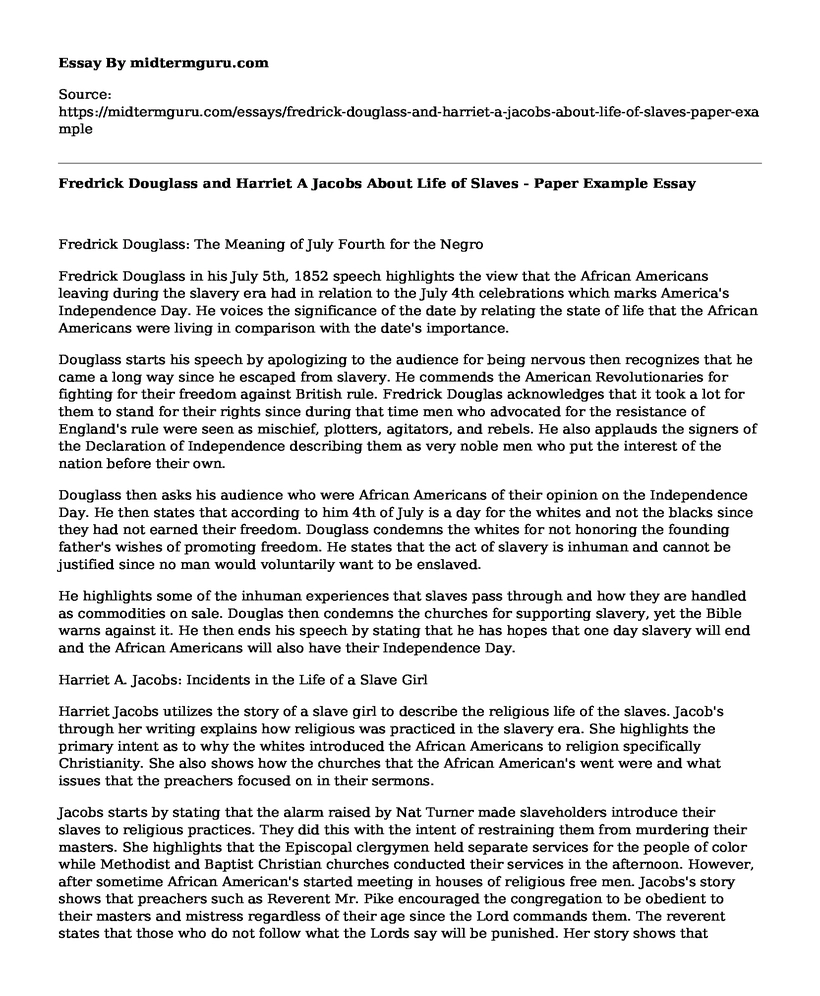Fredrick Douglass: The Meaning of July Fourth for the Negro
Fredrick Douglass in his July 5th, 1852 speech highlights the view that the African Americans leaving during the slavery era had in relation to the July 4th celebrations which marks America's Independence Day. He voices the significance of the date by relating the state of life that the African Americans were living in comparison with the date's importance.
Douglass starts his speech by apologizing to the audience for being nervous then recognizes that he came a long way since he escaped from slavery. He commends the American Revolutionaries for fighting for their freedom against British rule. Fredrick Douglas acknowledges that it took a lot for them to stand for their rights since during that time men who advocated for the resistance of England's rule were seen as mischief, plotters, agitators, and rebels. He also applauds the signers of the Declaration of Independence describing them as very noble men who put the interest of the nation before their own.
Douglass then asks his audience who were African Americans of their opinion on the Independence Day. He then states that according to him 4th of July is a day for the whites and not the blacks since they had not earned their freedom. Douglass condemns the whites for not honoring the founding father's wishes of promoting freedom. He states that the act of slavery is inhuman and cannot be justified since no man would voluntarily want to be enslaved.
He highlights some of the inhuman experiences that slaves pass through and how they are handled as commodities on sale. Douglas then condemns the churches for supporting slavery, yet the Bible warns against it. He then ends his speech by stating that he has hopes that one day slavery will end and the African Americans will also have their Independence Day.
Harriet A. Jacobs: Incidents in the Life of a Slave Girl
Harriet Jacobs utilizes the story of a slave girl to describe the religious life of the slaves. Jacob's through her writing explains how religious was practiced in the slavery era. She highlights the primary intent as to why the whites introduced the African Americans to religion specifically Christianity. She also shows how the churches that the African American's went were and what issues that the preachers focused on in their sermons.
Jacobs starts by stating that the alarm raised by Nat Turner made slaveholders introduce their slaves to religious practices. They did this with the intent of restraining them from murdering their masters. She highlights that the Episcopal clergymen held separate services for the people of color while Methodist and Baptist Christian churches conducted their services in the afternoon. However, after sometime African American's started meeting in houses of religious free men. Jacobs's story shows that preachers such as Reverent Mr. Pike encouraged the congregation to be obedient to their masters and mistress regardless of their age since the Lord commands them. The reverent states that those who do not follow what the Lords say will be punished. Her story shows that African Americans composed their songs and hymns that acted as a prayer for guidance and protection from God.
Jacobs highlights that most of the African Americans questioned their state of life and asked the Lord to ease their burden. She gives an example of a woman who laments the loss of her children. The woman stated that all her children were taken from her making her life pointless. She is then informed not to question the Lord by the class leader who she described as a white face black-hearted brother who was involved in slave trade.
Cite this page
Fredrick Douglass and Harriet A Jacobs About Life of Slaves - Paper Example. (2021, Jun 17). Retrieved from https://midtermguru.com/essays/fredrick-douglass-and-harriet-a-jacobs-about-life-of-slaves-paper-example
If you are the original author of this essay and no longer wish to have it published on the midtermguru.com website, please click below to request its removal:
- The Long Death of Slavery in the United States - History Essay Example
- Essay on US Foreign Policy and the Post World War II International System
- Slavery in Chocolate Industry: Systemic Issues & Economic Systems - Essay Sample
- Literary Analysis Essay on Girls at War
- Industrial Revolution: Advances and Challenges of the 18th-19th Century - Essay Sample
- Stock Market Crash: Catalyst of the Great Depression - Essay Sample
- The Role of Gender and Religion During the American Colonial Period - Essay Sample







